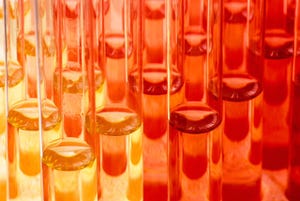February 3, 2021

Most COVID-19 developments are centered around rolling out the vaccines, but significant progress is still occurring in making tests for the virus.
On Wednesday, researchers at the University of Denver announced their new antibody test receiving emergency use authorization from FDA. The antibody test can predict if a person will experience mild or more severe symptoms of COVID-19.
The University of Denver's Knoebel Institute for Healthy Aging collaborated with clinicians from Resilience Code, a Denver functional medicine and human performance clinic, and Vibrant Sciences, a scientific and technical instruments manufacturer, to develop and study the test.
"The flexibility of the semiconductor-based multiplex platform enables testing for antibodies against multiple antigens," says Hari Krishnamurthy, director of biomedical engineering at Vibrant Sciences. "Originally developed to replace western blot testing for Lyme disease, we were able to rapidly reuse the technology to enable antibody testing for SARS-CoV-2".
The University of Denver’s test wasn’t the only positive development in the COVID-19 diagnostic space on Wednesday.
Becton, Dickinson, and Company was granted CE mark for expanded clinical applications for the BD Multitest 6-Color TBNK Reagent with BD Trucount Tubes. The expanded clinical applications could help clinicians identify COVID-19 patients at an increased relative risk of intubation with mechanical ventilation and mortality at hospital admission, in conjunction with clinical findings and the results of other laboratory testing.
In prepared remarks, Worldwide President of BD Biosciences, Puneet Sarin said, “the BD Multitest 6-Color TBNK Reagent with BD Trucount Tubes assay’s new claim related to risks of IMV and mortality may help clinicians better determine an appropriate course of action for hospitalized COVID-19 patients, which is a top priority for this population.”
Last month, Qiagen announced its polymerase chain reaction tests remain accurate and effective in detecting the new variants of COVID-19. The Hilden, Germany-based company’s CMO of Infection and Immune Diagnostics, Davide Manissero was featured on the Let’s Talk Medtech Podcast to speak about the effectiveness of the test.
“As of today, our molecular test to our array of PCR based tests for SARS, Co, V2 have not been affected in terms of sensitivity by any of the variants or I would say by any of the mutations detected so far,” Manissero said during the Let’s Talk Medtech interview.
Past COVID-19 Testing Breakthroughs

The maturation of COVID-19 tests has increased significantly since the pandemic gripped the U.S. nearly a year ago. Much of the changes occurred in the past few months.
LabCorp was one of the first companies MD+DI reported winning EUA to test asymptomatic people or those who have no reason to suspect COVID-19 infection. The Burlington, NC also received an indication to have pooled sample testing. It was the second to do so – Quest Diagnostics was the first to win the pooled sample indication from FDA.
In January, PerkinElmer won a EUA to test asymptomatic people too. Last week, Abbott Laboratories announced it won CE mark for the Panbio COVID-19 Ag Rapid Test Device for the detection of the SARS-CoV-2 virus: asymptomatic testing and self-swabbing.
Perhaps one of the biggest developments in the realm of testing came at the beginning of the pandemic and was from Rutger’s RUCDR Infinite Biologics along with Spectrum Solutions and Accurate Diagnostics Labs. The groups won EUA in April for a saliva-based SARS-CoV-2 test.
Recently, Rutgers University research professor, Andrew Brooks, who led in the creation of the saliva-based test, died unexpectantly, according to the University’s website. He was 51 years old.
About the Author(s)
You May Also Like




